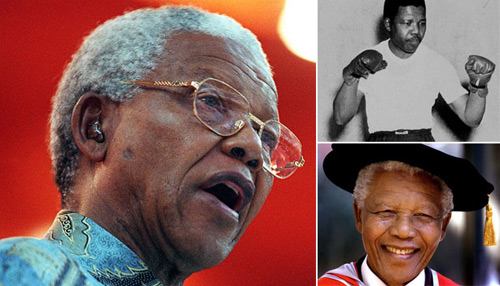
|
Nelson Mandela was a figure of international renown, and many details of his life and career were public knowledge. But here are six things you may not have known about the late South African leader. 1. He was a boxing fan. In his youth, Nelson Mandela enjoyed boxing and long-distance running. Even during the 27 years he spent in prison, he would exercise every morning. "I did not enjoy the violence of boxing so much as the science of it. I was intrigued by how one moved one's body to protect oneself, how one used a strategy both to attack and retreat, how one paced oneself over a match," he wrote in his autobiography Long Walk to Freedom. "Boxing is egalitarian. In the ring, rank, age, colour and wealth are irrelevant... I never did any real fighting after I entered politics. My main interest was in training; I found the rigorous exercise to be an excellent outlet for tension and stress. After a strenuous workout, I felt both mentally and physically lighter," he wrote. Among the memorabilia in the Mandela Family Museum in Soweto, visitors can find the world championship belt given to Mandela by American boxer Sugar Ray Leonard. 2. His original name was not Nelson. Rolihlahla Mandela was nine years old when a teacher at the primary Methodist school where he was studying in Qunu, South Africa, gave him an English name - Nelson - in accordance with the custom to give all school children Christian names. This was common practice in South Africa and in other parts of the continent, where a person could often be given an English name that foreigners would find easier to pronounce. Rolihlahla is not a common name in South Africa. It is Xhosa, one of the 11 official languages in the country, spoken by about 18% of the population. It literally means "pulling the branch of a tree", but its colloquial meaning is "troublemaker". His circumcision name was Dalibunga, meaning "founder of the Bunga", the traditional ruling body of the Transkei - the rural area where he was born. "To Xhosa traditionalists, this name is more acceptable than either of my two previous given names," he wrote in his autobiography. However, in South Africa, Mr Mandela was often called by his clan name - Madiba - which South Africans used out of respect. 3. He was on a US terror watch list until 2008. Prior to that, along with other former ANC leaders, Mr Mandela was only able to visit the US with special permission from the secretary of state, because the ANC had been designated a terrorist organisation by South Africa's former apartheid government. Ronald Reagan originally placed the ANC on the list in the 1980s. "It is frankly a rather embarrassing matter that I still have to waive in my own counterparts - the foreign minister of South Africa, not to mention the great leader, Nelson Mandela," then-Secretary of State Condoleezza Rice said in 2008. The bill scrapping the designation was introduced by Howard Berman, chairman of the House Committee on Foreign Affairs, who promised to "wipe away" the "indignity". 4. He forgot his glasses when he was released from prison. Mr Mandela's release on 11 February 1990 followed years of political pressure against apartheid. On the day, he was "astounded and a little bit alarmed", he recalled later. Mr Mandela's reading glasses stayed behind in prison Mr Mandela and his then-wife Winnie were taken to the centre of Cape Town to address a huge and euphoric crowd. But when he pulled out the text of his speech, he realised he had forgotten his glasses and had to borrow Winnie's. 5. He dressed up as a chauffeur to evade police. After going underground because of his ANC activities, Mr Mandela's ability to evade the securities services earned him the nickname "the black Pimpernel", after the novel The Scarlet Pimpernel, about a hero with a secret identity. A fake passport in the name of David Motsamayi used by Mr Mandela Mr Mandela is known to have disguised himself as a chauffeur, a gardener and a chef in order to travel around the country unnoticed by the authorities. Nobody seems to know how Mr Mandela, who had been operating underground with a false identity, was ultimately exposed and arrested. 6. He had his own law firm, but it took him years to get a law degree. Mr Mandela studied law on and off for 50 years from 1939, failing about half the courses he took. A two-year diploma in law on top of his university degree allowed him to practise, and in August 1952, he and Oliver Tambo established South Africa's first black law firm, Mandela and Tambo, in Johannesburg. He persevered to finally secure a law degree while in prison in 1989. |
纳尔逊·曼德拉是国际知名人物,他生活和事业的许多细节为公众所熟知。但这里提到的六件事可能是你对这位已故南非领导人并不了解的。 1. 他是个拳击迷。 纳尔逊·曼德拉年轻时就喜欢打拳击和长跑。即便在被囚禁的27年岁月里,他每天早晨仍然坚持练习。 “我更喜欢拳击的技巧而非暴力。我对如何移动身体保护自己、如何利用战术进攻和后退、如何在比赛中把握自己的节奏感兴趣,”他在自传《 漫漫自由路》中写道。 “拳击是平等的。在比赛场上,等级、年龄、肤色和财富都没有意义……我参与政治后从没打过真正的比赛。我的主要兴趣是在训练中;我发现严格的锻炼是释放紧张和压力的极好方式。高强度的训练之后,我感到身心更轻松,”他写道。 索韦托的曼德拉家族博物馆保存着许多纪念物,参观者会在其中发现一条拳击世界冠军的腰带,这是美国拳击名宿雷纳德(Sugar Ray Leonard)赠予曼德拉的。 2. 他最初的名字不叫纳尔逊,而是罗利赫拉赫拉·曼德拉(Rolihlahla Mandela )。 他九岁时在家乡库努的一所卫理公会小学就读,是学校老师给他取了一个英文名字——纳尔逊,为每名入学儿童起教名是当时的传统。 在南非和非洲大陆其他地方,一个人常常被取一个外国人觉得容易发音的英文名字。 罗利赫拉赫拉在南非不是常见的名字,它来自科萨语,南非有11种官方语言,操科萨语的人口占18%。“罗利赫拉赫拉”的字面意思是“拉树枝”,在口语中指“捣蛋鬼”。 他行割礼时取名“达理邦加(Dalibunga)”,意思是“邦加的建立者”,邦加是南非特兰斯凯地区的统治组织,曼德拉就出生在这里。“比起我的前两个名字,传统的科萨人更接受这个名字,”他在自传中说。但在南非,曼德拉先生常被按他的家族姓氏称呼——曼德拉,南非人这么称呼他是出于敬意。 3. 他的大名直到2008年一直列在美国恐怖分子观察名单上。 在此之前,曼德拉像其他非洲民族议会领导人一样,只能在获得美国国务卿特许后访问美国,原因是南非前种族隔离政府把非洲民族议会定名为恐怖组织。 上世纪八十年代,经里根总统同意,非洲民族议会被列入恐怖分子名单。 美国前国务卿赖斯在2008年说,“就连我对同等地位的南非外交部长做出让步时都明显感到尴尬,更不用说那位伟大的领袖曼德拉了。” 后来,是众议院外交委员会主席霍华德·伯尔曼发起了废除这一称号的法案,他承诺要为非洲民族议会“抹去”这一“侮辱”。 4. 曼德拉被从监狱释放时忘了带眼镜。 1990年2月11日,曼德拉获释,这是多年反种族隔离政治压力的结果。后来他回忆说,他当天“既惊愕又有点警惕”。 曼德拉和他当时的妻子温妮被带到开普敦市中心,大群喜悦的民众在那里等待他发言。他拿出演说稿时才发现忘了带眼镜,只好借了温妮的眼镜戴上。 5. 他曾穿上司机制服逃避警察。 非洲民族议会的活动遭到禁止后,他被迫转入地下活动。曼德拉躲避治安部队搜捕的能力为他赢得了“黑色繁笺花”的雅号,因为当时流行一部小说,《腥红色的繁笺花》(Scarlet Pimpernel),书中的男主人公就是一位有着秘密身份的地下英雄。 众所周知,他曾伪装成司机、园丁和厨师,目的是在全国各地旅行时不引起当局的注意。似乎没人知道为什么曼德拉最终暴露被捕,因为他一直利用假身份进行地下活动。 6. 尽管他拥有自己的律师事务所,但他花了半个世纪才获得法学学位。 曼德拉自1939年开始学习法律,50年中时断时续,有半数考试不及格。 他的最高大学学历是一张两年制的法学文凭,这让他有资格开业从事律师工作,1952年8月,他与奥利弗·坦博在约翰内斯堡建立南非第一家黑人律师事务所,曼德拉坦博律师事务所。 他在监狱里坚持学习,于1989年最后获得法学学位。 (译者 sxdns717 编辑 丹妮) |
